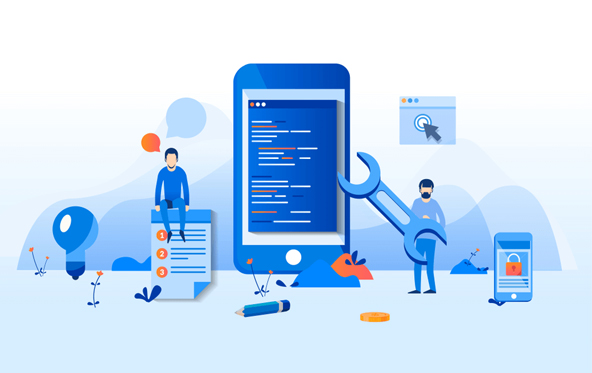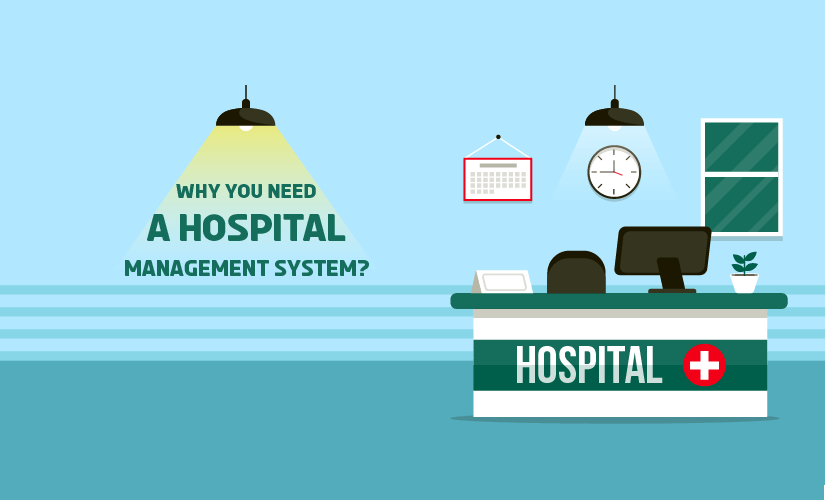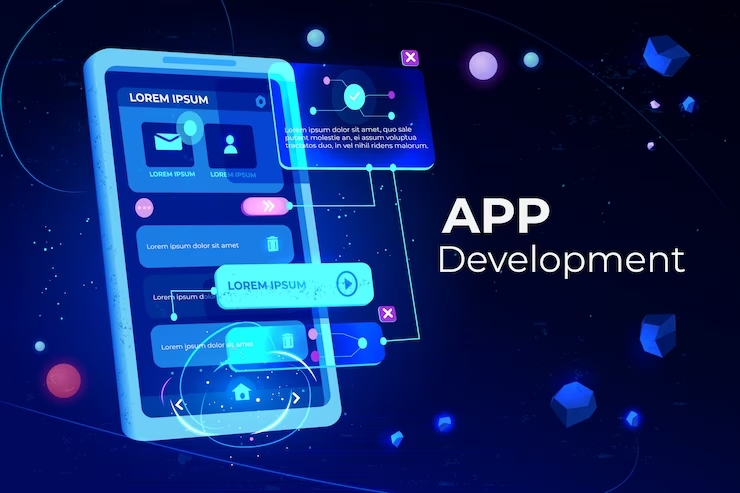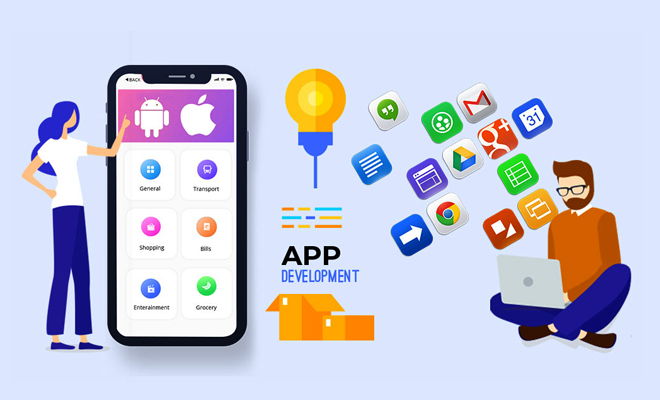Know About Mobile Application Development
If a couple of centuries ago people in different parts of the world were massively seized by the Gold Rush, now we can say with confidence that the modern world is completely and completely absorbed by the mobile fever. Is there at least one person in your environment who does not use a smartphone? Hardly. Smartphone sales are growing at lightning speed, and manufacturing companies are investing fabulous sums in mobile technologies, their development and popularization in the market. Mobile development is a very rapidly growing area of programming, because the number of mobile devices significantly exceeds the number of personal computers, and this trend will only grow. While Elon Musk continues to work on the colonization of Mars and chipping away at the human brain, we continue to use mobile phones everywhere – at work, at school, at home, on vacation … The demand for mobile application developers is growing at the same pace, but unlike front-end and back-end developers , the market is not yet saturated with mobile developers, so now is the time to start exploring this promising area. Let’s take a detailed look at what is meant by mobile application development and how relevant it is, who is a mobile application programmer , what skills he needs to master, where to start learning and what tools are used to develop mobile applications. Also, we will tell you what stages this process consists of, what is the cost of developing applications for smartphones and how much it pays off, we will figure out what the salary of a mobile developer is and how to make money on this for a beginner.

What Should Mobile App Developers Need To Know?
Mobile developers are those people who breathe life into soulless mobile boxes, some kind of shamanic spellcasters who speak a foreign language and can do almost everything, and sometimes this is true. But also these are the people who drive progress forward, creating more and more advanced and complex programs. A good programmer is not only knowledge of languages and technologies, it is also the skills of systems thinking, since he has to create complex systems from nothing, it is also the ability to work in a team, since it is difficult to write a serious project alone, this is the ability to communicate and understand customer to create exactly the product he wants. A mobile application developer, also known as a Mobile developer and Mobile programmer, is a programmer who develops software applications for all kinds of mobile devices, most often for smartphones and tablets. It is with the advent of voice and gesture interfaces on mobile devices that the profession of a mobile developer is now rightfully considered the most fashionable and in demand. All mobile developers can be divided into two categories, depending on the software for which they create programs – iOS developers and Android developers. Specialists from the first category are considered the most profitable in the labor market, moreover, after the appearance of the Swift and Objective-C languages, creating applications for Apple has become very easy and convenient. Programmers who create applications for Android use the Java language in their work, which is considered the most reliable for developing mobile applications for this operating system. What are the main tasks of a mobile application developer:
- creation of technical specifications (terms of reference) for the development of a mobile application;
- discussion with the customer of the stages and progress of the project;
- building the application architecture;
- direct programming; work with designers; support for mobile applications;
- work with testers on debugging and testing applications;
- assistance in creating instructions for working with the finished application;
- paperwork; placement of applications in the App Store and Google Play Market,
- Amazon App store,
- Opera Mobile Store and other mobile application stores.
What is mobile app development?
First of all, these are the platforms that we use every day with our smartphones – Android and iOS, they occupy approximately 95% of the entire mobile device market. The rest goes to Linux, Windows, Symbian and other less popular platforms. In addition to smartphones, mobile gadgets and mobile devices can also include tablets, electronic watches, fitness trackers, and a huge number of new gadgets, which appear more and more every year – for example, glasses with augmented reality and smart TV. All these devices often also use our main 2 platforms, and applications for them can be attributed to mobile development. How to develop mobile applications? What tools do you have and what do you need? The very first thing is to learn programming languages to develop mobile applications. Different languages are suitable for different platforms, so you first need to decide on the platform you are interested in, and then on the language. Development of mobile applications for Android is most often done in Java, the good old object-oriented, high-level language in which more than 90% of all applications for Android are written. Over the past six months, the new Kotlin language has gained great popularity. So far, about 5% of applications on Google Play are written in Kotlin, but the number of these applications is growing every year. If we talk about the iOS platform, then two main languages \u200b\u200b are also used here – Objective C, which is also the first language that was developed by Apple for writing applications for iOS. And the second language is a more advanced and more modern Swift. If we talk about supporting old proposals that were written earlier, then here you definitely need to know Objective C, while new applications are increasingly being written in Swift. It is worth mentioning that C++ is sometimes used for both platforms. It is used when you want to get the best performance from your application. It is very rare, but still possible, to find the use of languages such as Python, C # and Unity in mobile development, especially after the release of new frameworks and libraries for them, because by default these languages do not have built-in tools for mobile devices. For example, the release of the Kivy Python framework has rapidly promoted the use of the Python language in mobile programming. What are the features of mobile application development? The main feature in the development of mobile applications lies in the form factor of the devices themselves, for which we write programs, because these are smartphones, tablets that have a small or small screen, or a non-standard (square, rectangular) screen. In addition, if we take a smart watch, then this is a 2×2 cm screen, or even a round screen. Therefore, a very important point in creating a mobile application is the so-called User Experience, that is, interaction with the user. The next important point in the development of mobile applications is the wide variety of devices for which we want to create an application. That is, when an application is created, it can only be calculated for smartphones, or for smartphones / tablets / watches, for various augmented reality devices, or it can be calculated for interaction between several screens at the same time.

Mobile app development – what is it?
The concept of developing mobile applications for smartphones, tablets and other mobile devices includes writing program code in order to create programs that will work on certain mobile platforms (today there are 2 main platforms for mobile operating systems – Android and iOS, and less popular Windows Phone and Symbian). These programs and applications may be per-installed on mobile phones, personal digital assistants, corporate digital assistants, smartphones and other mobile devices before the devices fall into the hands of the user, or downloaded by users to the device directly during use.
When developing a mobile application, developers should always consider how much attention is limited to the size of the screen, how to reduce the number of keystrokes, and how to fit the required set of functions into the application in the most compact way. Therefore, for mobile developers, the process of developing mobile applications is often not limited to just writing code for the task, mobile application development includes a wider and more creative range of activities. What services are included in the development? Mobile application development services can also be divided depending on the platform for which the application will be created. Basic services include Application development for iOS. Application development for Android. Development of VR, AR, MR applications.
Many studios offer full turnkey project creation and management. In this case, the package of services for the development of a mobile application may include: Analysis of the task, full immersion in the project (including analysis of the competitive environment) and search for possible existing IT solutions. Preparation of a concept and development of a design solution (UX / UI / IA-design), TOR (terms of reference for developers). Development of mobile functionality. Testing, debugging and auditing. Implementation of the application (implementation, maintenance and support). Connecting analytics, publishing an application in online application markets. Both studios and private specialists can be asked to develop a complete package, or help with individual tasks. For example, if you already have a prepared terms of reference and developed a concept, and you only need to write the code part, this will be a separate independent service. How relevant is mobile app development? Smartphones and other mobile devices have not only become part of our daily lives, they are a complete offer of us. With the help of mobile phones, we not only communicate with each other, but also order goods from stores, buy tickets, book accommodation, call a taxi, use phones as navigators, photo and video cameras, readers, online banks, and just as a way to have fun and pass time. According to statistics published in Data portal , 67% of adults worldwide use smartphones daily, which is almost 5.19 billion people (out of a total population of 7.75 billion). The trend towards the transition from simple mobile devices to feature-rich smartphones is only increasing every year. It is assumed that in the near future a person will be directly connected with his smartphone, that is, all functions and all information from our gadgets will directly enter our brain. And while many inventors are working on it, people are wasting their time on seemingly useless apps like low-frequency mosquito repellent, watermelon ripeness indicator, bubble wrap simulator, or an app that visually transforms a smartphone screen into a glass of beer. In short, the relevance of mobile application development is growing not only every year, but also every month. Hundreds of new mobile apps are released online every day. It would seem difficult to come up with something new, but good developments in collaboration with good marketing can bring a lot of money to the creator, a clear confirmation of this is the recently sensational TikTok, whose ratings continue to grow at lightning speed. What does a mobile app developer need to know? A mobile application developer, like any other programmer, must have both technical skills and personal qualities to successfully work in a team – soft skills . In this case, the following soft skills are needed: Structural and analytical thinking; Attentiveness; perseverance; Communication skills; Creativity and creativity; Willingness and ability to self-learn; A responsibility. You will have to sweat harder with technical skills, but using modern programming languages that are used to develop mobile applications for Android or iOS, it is quite possible to create your first creation in a month. You can develop some simple games and even make a profit from them after monetization, but learning the profession of a mobile programmer is far from exhausted. If you go to Google Play or the AppStore, you will see that the majority of such applications, and especially in games (if you look closely, there will be 8 out of 10 such games). A simple application can be created by every average developer, but in order not to remain in the ranks of the “average”, you will have to work hard to create something really interesting and original, and most importantly, of high quality. CSS and HTML, Cocoa/Xcode development environments, Objective-C/С++ programming languages, Java; HTTP, XML, principles of object-oriented programming, DBMS; Knowledge of Android, iOS SDK, design patterns, common libraries and architecture of iOS, Android, scripting programming languages (Ruby, Python), principles of client-server model of application interaction; Knowledge of the requirements for application releases in the AppStore and Google Play; Skills in working with Core Data (Apple’s proprietary local database, which is built like SQL) are in demand; Ability to understand other people’s code; Proficiency in technical English. Where does training start? How to learn? So you’ve decided to try your hand at mobile app development, where do you start? To become a mobile app developer, you first need to have a solid foundation. Experienced programmers are advised to start their studies with computer science ( computer science ) or software engineering (software engineering), data structures of classical algorithms, hash tables and so on. It is necessary to understand the basic concepts that are used in programming and do not depend on the programming language or device. It will be useful to know the basics of C ++, although many consider it already obsolete. This is partly true, but these are the basics of the foundations without which Java and PHP would not have arisen. Also, it will be useful to learn about data protection, encryption, network protocols and the unix kernel. Really high-quality software is not only a program that works without errors, it is a user-friendly interface and well-thought-out logic of work, taking into account all possible outcomes of events and options for their development.
1. Your Concept Should Be Unique
Your App Should be unique enough to fulfill your business requirements.. Identify the added value that the new app should generate for your customers. Write down the app’s unique selling points. And think about other platforms that might be more suitable for your plans.
1. Your Concept Should Be Unique
Your App Should be unique enough to fulfill your business requirements.. Identify the added value that the new app should generate for your customers. Write down the app’s unique selling points. And think about other platforms that might be more suitable for your plans.
2. Don’t Make Mistake To Plan Your Own Business
Every project needs a high quality business plan. Mobile apps are no exception. The app market is saturated with experienced gamers who know how to do things efficiently. Make sure you put enough effort into careful planning.
3. Your budget is not sufficient for a quality product
Mobile app development costs a lot of money (more on that later). Therefore, you must have substantial resources for both development and subsequent maintenance. The required investments are typically in the tens of thousands of pounds minimum. If you invest less and take an amateurish approach, there is a good chance that the application will not be successful.
4. You’re not thinking about marketing
Today’s mobile app industry is very competitive. It would be naive to think that the app will come to the user on its own without you taking any action. You must have both an appropriate advertising strategy and marketing budget in place for your app project.
5. You overestimate your capacities
Even if you choose the most suitable agent, application development is a demanding process. Make sure to reserve enough capacity for intensive collaboration, meetings, seminars, and planning.
6. Your idea has not been validated
When we are really passionate about something, we tend to overlook some pitfalls. This is why proof of concept is so important. Be sure to test your ideas before turning them into reality. The first step is to create a prototype and test it with real users – do they like it? Will they use the app?
7. You underestimate your competitors
Invest a lot of effort into preliminary market research to discover any alternative solutions that already exist. Or perhaps existed before but are out of business now. Try to find out why and learn from their mistakes.
8. You’re focussing solely on the app
Mobile apps can be amazing assets to your business but there are very few projects which could be built exclusively on an app. You will most likely also need a back-end, promotional website, perhaps even a web version of your app or technical support.
9. You think it will all end with the launch
It’s highly unlikely that your app won’t require any additional effort after the launch (especially if it’s successful). One could say that mobile app development is a never-ending process. Make sure you maintain the app correctly and apply further iterative development – we will zoom in on that later.












